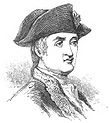|
|
| Line 1: |
Line 1: |
| <pre> | | <pre> |
| X:1 | | X:1 |
| T:Easter Snow | | T:Admiral Rodney's delight |
| M:C | | M:6/8 |
| L:1/8 | | L:1/8 |
| R:Air
| | B:Thompson's Compleat Collection of 200 Favourite Country Dances, vol. 2 (London, 1765) |
| S:Stanford/Petrie - Complete Collection, No. 1123 (1905)
| | Z:Transcribed and edited by Fynnian Titford-Mock, 2007 |
| Z:AK/Fiddler's Companion | | Z:abc's:AK/Fiddler's Companion |
| K:F | | K:G |
| f/e/|dc de fd cB|Ac AF D2 FG|Ac dA cA GA|F2F2F2:||
| | gdB ecA|dBG AFD|gdB ecA|1 efg cBG:|2 BdF G3|| |
| c/d/e/|f2 A2 cd ef|g3b a2 ga|f2 Ac BA GA|F2 Ac f2 (3cde|
| | |:def gbg|faf e^cA|def gbg|fa^c d2g:| |
| f2A2 cd ef|g3b a2g2|f2 Ac BA GA|F2 Ac f2 (3efg|
| | |:d2e dBG|F2G AFD|d2g dBG|cAF G2g:|| |
| fe de fd cB|Ac AF D2 FG|Ac dA cA GA|F2F2F2||
| |
| </pre> | | </pre> |
| <!-- <p><font face="garamond, serif" size="4"> -->
| | ---- |
| <p>
| | [Annotation:[{{PAGENAME}}|]] |
| '''[[Easter Snow | EASTER SNOW]]'''. Irish, Air (3/4 time). F Major (Stanford/Petrie): G Major (Ó Canainn). Standard tuning (fiddle). AAB. Caoimhin Mac Aoidh explains the title is an English version of the Gaelic name ''Diseart Nuadhain'', a placename in north Roscommon which can today be found in the form of Estersnow (or Diseart Nuadhan, St. Nuadha's Hermitage), a Boyle rural district. Mac Aoidh states that Petrie appears to have literaly translated the English back into Irish as "Sneachia Casga" as an alternate title. The same air is to be found in Brendan Rogers manuscript collection (in the Irish Traditional Music Archive) noted from the performances of attendees at the Feis Ceoil competitions held in Belfast in 1898 and 1900. The musical family the Dohertys of Donegal had a different air by the same title, and the great Donegal piper, Tarlach Mac Suibhne, played a different air than the Dohertys. Mac Suibhne's playing of "Easter Snow" was recorded by the Dublin '''Evening Telegraph''' in 1897, when he was one of seven pipers at the first Feis, held in that city (the title in the newspaper was "Sneachta na Casga"). Finally, regarding this tune, Mac Aoidh notes that fiddler John Doherty personified "Easter Snow" as a woman, Ester Snow, whom he maintained was over six feet tall, very beautiful, and had skin as white as snow (leading to her name). Paddy Tunney, on his album "The Stone Fiddle" wrote: | | |
| <blockquote>
| | ---- |
| ''EASTER SNOW''<br>
| | <p><font face="garamond, serif" size="4"> |
| | '''ADMIRAL RODNEY'S DELIGHT'''. English, Jig. G Major. Standard tuning. AA'BBCC. Admiral Rodney won a spectacular victory ''(the Battle of the Saints'') against a French fleet under Admiral Comte De Grasse in the West Indies in the year 1782. |
| <br> | | <br> |
| ''At twilight in the morning as I roved out upon the dew''<br>
| | [[File:Rodney.jpg|110px|link=|Admiral Lord Rodney]] |
| ''With my morning cloak around me intending all my flocks to view''<br>
| |
| ''I spied a lovely fair one she seemed to be a beauty bright''<br>
| |
| ''And I took her for Diana or the evening star that rules the night''<br>
| |
| <br> | | <br> |
| ''I being so much surprised by her it being the forenoon of the day''<br>
| | See note for “[[Talk:Rodney’s Glory (1)]]” for more information. The tune was included by Northumbrian musician William Vickers in his large manuscript collection of 1770, although it originally appeared in London publisher Charles and Samuel Thompson’s 1765 collection. |
| ''To see that lovely creature coming o'er the banks of sweet Loughrea''<br>
| |
| ''Her snow-white breast lay naked and her cheeks they were a rosy red''<br>
| |
| ''And my heart was captivated by the two black eyes rolled in her head''<br>
| |
| <br> | | <br> |
| ''Fair maid I cried, your love I crave for Cupid is a cruel foe''<br>
| | </font></p> |
| ''I'll roll you in my morning cloak and I'll bring you home to Easter Snow''<br>
| | ---- |
| ''Go home, acquaint your parents and indeed kind sir, I'll do the same''<br>
| |
| ''And if both our parents give consent neither you nor I will bear the blame''...... [from the singing of Mrs. Brigid Tunney]<br>
| |
| </blockquote> | |
| </p> | |
| <!-- </font></p> -->
| |
X:1
T:Admiral Rodney's delight
M:6/8
L:1/8
B:Thompson's Compleat Collection of 200 Favourite Country Dances, vol. 2 (London, 1765)
Z:Transcribed and edited by Fynnian Titford-Mock, 2007
Z:abc's:AK/Fiddler's Companion
K:G
gdB ecA|dBG AFD|gdB ecA|1 efg cBG:|2 BdF G3||
|:def gbg|faf e^cA|def gbg|fa^c d2g:|
|:d2e dBG|F2G AFD|d2g dBG|cAF G2g:||
[Annotation:[Featured Tune|]]
ADMIRAL RODNEY'S DELIGHT. English, Jig. G Major. Standard tuning. AA'BBCC. Admiral Rodney won a spectacular victory (the Battle of the Saints) against a French fleet under Admiral Comte De Grasse in the West Indies in the year 1782.

See note for “Talk:Rodney’s Glory (1)” for more information. The tune was included by Northumbrian musician William Vickers in his large manuscript collection of 1770, although it originally appeared in London publisher Charles and Samuel Thompson’s 1765 collection.

